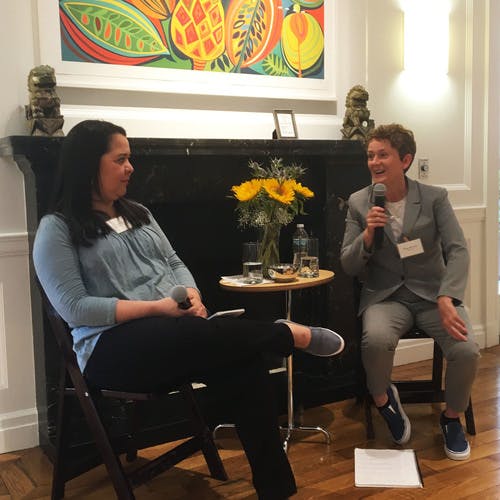Time For Philanthropy To Be Brave
9 November 2017
Dear friends,
It is with great enthusiasm that I recently began as the Chief Executive Officer of Foundation for a Just Society. In doing so, I find myself in the rare but wonderful position of taking a leadership role at a foundation I had previously worked with, for several years, as a grantee partner. During those years, I grew to admire and respect the thoughtful, innovative, and authentic way FJS approaches philanthropy.
I don’t use the term ‘privilege’ lightly, yet it is truly a privilege to work at a foundation that listens to, trusts, and responds to its grantee partners. As a former grantee, I was impressed with how FJS staff and Board members listened carefully to what I had to say and took my feedback into consideration — whether it was positive or critical. This showed me that they truly walk the talk of a field-led philanthropy. As I begin my work at FJS, I want to acknowledge and honor the hard work and vision of the founder, Board, and current and former staff who have worked to build the foundation over the last six years.
As someone who is dedicated to feminism, social justice, and working with not for communities most affected by inequalities, I intend to continue the foundation’s elegant mission: to meet immediate needs while igniting long-term, structural change. And we will continue to do this by following the lead of marginalized women, girls, and LGBTQI people who catalyze change every day in their communities and countries.
In many ways, it couldn’t be simpler: invest in the people who are on the frontlines of transformative work and make it easier for them to access the resources they need. Provide these resources more equitably and in ways that increase collaboration, not competition, across the full ecosystem of organizations that have different levels of influence and access, and that use different strategies for creating change. All of these organizations play critical roles that are valuable and necessary. Activist-led funding is something that is extremely important to me, and I’m grateful that FJS is committed to partnerships that are based in trust, transparency, mutual accountability, and enabling communities to define and pursue their own objectives.
In today’s world, women, girls, and LGBTQI people are facing numerous and immediate threats: climate change, criminalization, forced migration, police violence, deportation. The strength of democracies is diminishing while governments increase restrictions on the ability of women, girls, and LGBTQI people to organize for their rights — to bodily autonomy, an education, a living wage. We are hearing the struggles of our grantee partners in places as distant and distinct as Burma, Senegal, El Salvador, and Mississippi. While the specific circumstances differ, there are common threads to the challenges they encounter, some of which are challenges related to funding. These commonalities demonstrate the need for philanthropy to make different choices about the quality of support it provides to movements at a time that is filled with repression yet rich with opportunity.
Feminist movements around the world are confronting these challenges with renewed purpose, determination, and creativity. There is growing solidarity within and across movements and an embrace of leadership that represents the most affected communities. Women and trans people from marginalized communities are at the forefront — and the center — of collaborative, cross-movement, grassroots organizing that is resisting the attempts to undermine gains that have been made. They are putting forward visions for, and ways to achieve, justice — and responding vigorously to attacks.
While we know that marginalized communities have always been the vanguard of social change, I am moved that leaders within these movements are finally beginning to receive recognition. These leaders engage in activism differently: their approaches are more expansive and inviting, and their strategies build a shared agenda that takes into account the broad set of realities confronting the vast majority of people in the world. Still, the philanthropic sector needs to do a better job at recognizing and supporting work that doesn’t align with an approach that prioritizes a single issue or identity. By supporting those who work collectively and inclusively, we can ensure a better chance of success.
If philanthropy takes an approach that is only about surviving this moment, then we are not doing enough. This is a moment where movements are ready for bolder risks and bigger investments. It is a moment for philanthropy to be brave.
We should invest in approaches that help people survive the day-to-day — and also ones that give activists the space they need to proactively envision and carry out long-term strategies. We should make these investments in ways that aren’t harmful, cumbersome, or out of reach for smaller groups. And we should ensure that our funding is responsive to movement needs by displaying greater trust and embracing ambiguity through flexible, core, long-term support. We want to see more and better funding going directly to those who are on the frontlines of progressive change — it is what movements are demanding.
In this moment of reflection and growth, FJS invites movement leaders and collaborators to engage with us. Tell us what we should be funding. Let us know when we make mistakes. As is true to our history as a foundation, FJS will continue to carry out its mission with the guidance of the organizations and movements with whom we partner. We won’t go in a different direction without a process of speaking with and being accountable to our community.
It is an honor to join this foundation and work with you to create a world where all people are valued and lead self-determined lives.
With hope and in solidarity,
Nicky

